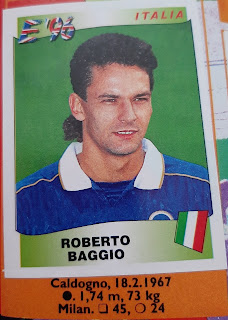89: Dennis Bergkamp, Nederland, Panini England European Football Championship ’96
Much earlier in the year one of our readers, Peter van Garderen, gave us a list of suggestions for future posts. Today we take a look at someone who ticks so many 90s football boxes it’s practically indecent. A student of the Ajax school who came to Serie A before lighting up the Premier League who even managed to score a fantastic last minute goal in a World Cup knockout game which ultimately led to his nation falling short in the semi-finals. We hope this does the job Peter.
You would be forgiven for thinking that the greatest travesty in English football in the 1990s was that Carlton Palmer gained more international caps than Matt Le Tissier but I’m inclined to disagree. Quite how the exceptional talents of Football Italia’s James Richardson weren’t snapped up by any of the major sporting broadcasters when the iconic programme departed from Channel 4’s screens beggars belief. The linen suits, extravagant coffees and stack of newspapers were impressive enough but the man’s presenting skills were truly exceptional. Whether convincing Attilio Lombardo to join him in dancing the Lambada, interviewing the stars of Serie A in fluent Italian or making Paul Ince seem interesting he brought a fresh new approach to the role.
It was through Richardson’s turn of phrase that I first became familiar with the Dutch forward Dennis Bergkamp. He had arrived at Inter Milan off the back of 122 goals in 237 games at Ajax, where he also won the Eredivisie, KNVB Cup, UEFA Cup and Cup Winners’ Cup, and 16 goals in his first 26 caps for the Netherlands. His first season in Milan was a mixed bag with 18 goals across 48 appearances helping the Nerazzurri to the UEFA Cup but a failure to click with fellow forwards Ruben Sosa and Toto Schillaci and well organised domestic defences saw them finish just one point off the relegation zone in Serie A. Bergkamp bagged three goals at USA ’94 but once again struggled in Italy with just four goals in the 1994/95 campaign. His quiet demeanour did little to distract from his mediocre form and the Italian press turned on him referring to him as their ‘Donkey of the Week’ following a poor performance. From behind his pile of pastries and papers the quick thinking Richardson dubbed Bergkamp as “the costly clog-wearer”.
In the summer of 1995 this moniker failed to put Arsenal’s new manager Bruce Rioch off from splashing out a club record £7.5m to bring Bergkamp to Highbury. In his first seven games for the Gunners it looked as though Football Italia’s finest might have been on to something as the Dutchman failed to find the net and looked ill at ease with the pace and physicality of the Premier League. Whenever a striker goes through a lean patch these days either they themselves, a team-mate or their manager hit the press to assure restless fans and pundits alike that goals are just around the corner. Similarly I am yet to play a game of cricket where I haven’t heard someone attempt to convince me at the start of my run up that “one brings two” regardless of the flurry of boundaries that have met the previous five balls. However, at Highbury in September 1995, Bergkamp scored two technically excellent goals against Southampton to kickstart his career in the Premier League and set off on his road to becoming an Arsenal legend. Sixteen goals in 41 games was just a taste of what was to come.
The arrival of Arsene Wenger in North London in September 1996 changed many things for the Gunners. Gone were the days of nine motorway dinners and miserly defences and in came pasta and free flowing attacking football. Dennis Bergkamp too was a player transformed. He added a further fourteen goals in the 1996/97 campaign and was the club’s top scorer with 22 goals in 40 appearances as Arsenal secured a Premier League and FA Cup double in 1997/98. Although he missed out on the latter’s showpiece event due to injury he was crowned the PFA Players’ Player of the Year and had reached full fitness ahead of the World Cup in France. He scored three goals at the tournament to help the Netherlands to the semi-finals including a genuinely sensational last minute winner against Argentina. As their opponents had snuck past England in the previous round thanks to a penalty shootout and a dodgy dismissal for David Beckham it’s fair to say his popularity soared in his employer’s homeland.
Although Brazil denied the Netherlands a spot in the final (and an inspired Croatia stole third place) Bergkamp returned to North London firmly established as one of the best players in Europe if not the world. He retired from international football in 2000 as his nation’s top scorer with 37 goals, a record later surpassed by Patrick Kluivert, to focus on his club career. Clearly the increased head space was beneficial as he helped Arsenal to two further Premier League titles, playing an integral part in their ‘Invincibles’ season in 2003/04, as well as an additional three FA Cups and Charity Shields. When he hung up his boots in 2006 he was rewarded with a testimonial against his first club Ajax to herald the opening of Arsenal’s brand new Emirates Stadium and, one year later, was voted into the English Football Hall of Fame. In 2014 he was immortalised in bronze in two separate locations: outside the Emirates and the Dutch FA’s headquarters in the town of Zeist. With 264 club goals in 734 appearances, many of which were truly spectacular, it’s hardly a surprise that Dennis Bergkamp continues to be held in such high regard by football fans across the world. Not bad for a costly clog-wearer.





Comments
Post a Comment